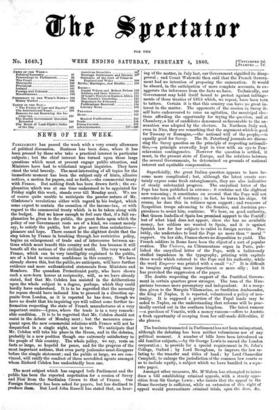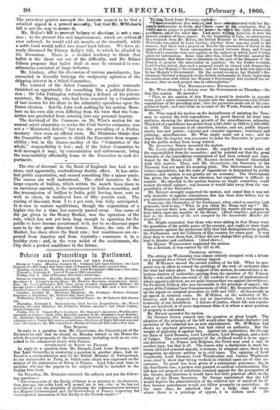The business transacted in Parliament has not been unimportant, although
the debating has been neither voluminous nor of any political moment. A number of bills have been introduced on old familiar subjects,—by Sir George Lewis to amend the London corporation ; to provide for a special requirement in St. John's College, Oxford ; by Lord Brougham, to improve the law re- lating to the transfer and titles of land ; by Lord Chancellor Campbell; to enlarge the jurisdiction of the common law courts so as to include equity, a subject which we have handled in a sepa- rate paper.
Amongst other measures, Mr. M‘Mahon has attempted to intro- duce a bill establishing criminal appeals, with a sturdy oppo- sition from Sir George Lewis ; who insists that the appeal to the Home Secretary is sufficient, while an extension of this right of appeal would procrastinate criminal trials, open the door, &c. The prevalent opinion amongst the „lawyers seemed to be that a criminal appeal is a proved necessity, but that Mr. Marshal's bill is not the way to Immure it.
Mr. Mellor's bill to !Prevent 'bribery at iilections is 'not a sun- • cess ; to the present fine and imprisonment, which. are seldom if ever enforced, he would add six months at the treadmill, while a noble Lord would inflict two years' hard labour. We have al- ready discussed Sir Fitzroy Kelly's bill, to which he alluded in the discussion. There is a decided tendency to think that ballot is the short cut out of the difficulty, and Mr. "Milner Gibson proposes that ballot shall at once be extended to con- stituencies convicted of large briberies.
Mr. Lindsay, after the discussion of various amendments, has succeeded in decently burying the reciprocity agitation of the shipping interest in a Select Committee.
The renewal of the Select Committee on pocket contracts furnished an opportunity for something like a political discus- sion.; Sir John Paldngton volunteering a defence of his private secretary, Mr. Murray, who had been censured by a Committee of last session for his share in the Admiralty operations upon the Dover election. But Sir John took nothing by his motion. Mem- bers on his own side even differing from his view that the Com- mittee was precluded from entering into any personal inquiry.
The decision.% of the Commons on Mr. Wise's motion for an annual select committee to revise the Civil Service estimates, was not a "Ministerial defeat," but was the prevailing of a Parlia- mentary view over, an official view. Mr. Gladstone thinks that the Committee will operate to shield the Executive from respon- sibility; but, in the chance-medley of the "Committee of the whole," responsibility is lost ; and, if the Select Committee be well managed it may, by concentration and enforcement, bring the responsibility effectually home to the Executive in each de- partment.



























